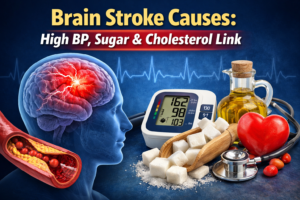The real test of courage occurs when a loved one is on the brink of life and death. How do we then deal with the ultimate truth that life is unpredictable?

A couple of months ago, I was demonstrating a surgical procedure live at a conference. A colleague and I were exhibiting how to perform a minimally invasive spinal fixation in a patient with degenerative instability of the spine. The surgery was being telecast live to a conference room where a receptive and enthused audience had gathered. It was simultaneously being broadcast online, where a few hundred people were attending. Besides the usual surgical paraphernalia that adorns someone who operates, we were hooked on to mics where we could explain to the audience what we were doing and answer questions related to our decision making, technique, and nuance. The crowd was replete with resident doctors and junior and senior colleagues, all of whom watched our every move with a hawk’s eye. Being part of a scenario like this can be unnerving, but I am surprisingly comfortable with this mode of teaching; we regularly have observers and visitors in our operation theatres from other institutes whom we are happy to teach.
Just as I completed inserting the final screw to complete the procedure, the anaesthetist tapped me on my shoulder, signalling that I should step down from the platform I was standing on. She asked the audio–video guys to turn my mic off and indicated to my colleague to continue with surgery. I was temporarily perplexed. I was sure I hadn’t done anything silly, and I double-checked to confirm that the patient was stable. We were just about to conclude a perfect operation I was proud of.
She took me to the side and in a very maternal voice whispered, “Your father has just had a heart attack.” “My father?” I questioned, not from fear or panic but simply from disbelief that such a robust, energetic, and one-in-a-million man would fall prey to a such a mundane condition. “He had severe chest pain which has gotten better with sorbitrate, but they have ordered cardiac enzymes and are planning to do an angiogram,” she concluded. “So how do we know it’s a heart attack?” I asked, with only half the information available to us. “You should just go,” she reasoned.
My father is a surgeon too and was in his hospital when it must have happened, so I knew he would be well taken care of. I removed my gloves and gown while my colleague completed the last bit of the procedure. Once I got hold of my phone, I was assured he was conscious and fine as they wheeled him in for an angiogram. I gave verbal consent to his team to go ahead and do what they deemed fit.
I drove two hours from the grubby suburbs of Mumbai into town where he was. As I restlessly manoeuvred though horrendous traffic, I pondered about the shortcomings of life. The magnitude of the adage ‘how unpredictable life is’ begins to dawn on you only when it strikes home and affects your own blood. As neurosurgeons, no one is more prepared for uncertainty than we are, but just as we begin to tell ourselves we’ve seen it all, life throws us another curveball. Half an hour and only half a kilometre later, I was informed that the angiogram was normal and that he didn’t need a stent, but he would need to be started on blood thinners as his cardiac markers were marginally elevated. He hadn’t had a heart attack after all. By the time I finally reached, he was lying comfortably in the ICU and sipping tasteless hospital chai, showing family and friends his biceps at the age of 78.
Cut back to a couple of weeks ago. My mother had travelled back from London via tiring connections on a Saturday afternoon. We stay in the same building; she is on the third floor while I’m on the ground. When I went to see her early in the evening, she was resting in bed. “I’m very sleepy, I’ll talk to you later,” she turned on her side and buried her head into the pillow. One hour later, her house help rings my door bell slightly worried, “I’m trying to wake up madam to give her tea but she’s not moving,” she said in Hindi. “She’s not eaten anything since she came back,” she continued, trying to give me some context. I rushed up to see her and was shocked at what I saw.
My mother was breathing heavily, almost grunting. Her tongue had rolled back in her mouth, obstructing her airway. Her eyes were roving in all directions. “Mom!” I shouted, slapping her face like they do in the movies. I dug my fist into her sternum to see if there was any response to pain. None. I shone my phone torch in her eyes, thankfully noting that her pupils were reacting well. That meant she wasn’t brain dead. I had to quickly transition from thinking like a son to behaving like a doctor. I turned her to the side and made sure her airway was protected. “This could be a stroke or a massive bleed in the brain,” I thought to myself, having seen thousands of patients who have looked exactly like this. But I also know she’s diabetic, and the first thing to do in anyone with altered sensorium is to check their sugar. I was aghast to see that it had plummeted to 30, where the normal range is 80–120. This was dangerously low. She was in a hypoglycaemic coma and all I needed to do was to get sugar into her system but there was no way to do it orally.
I had two options: I could either run to a chemist and get an intravenous cannula, tubing, and dextrose or I could take her to the hospital, both of which would take me 20 minutes. She was on the brink of life or death, and the decision I made could decide which side she rolled over on. A thousand thoughts ravaged my mind. What if the chemist doesn’t have everything I need and I’m not able to get the sugar into her on time? What if it’s something more than just hypoglycaemia and she needs a scan of the brain? What if I’m late in getting her to the hospital and she sustains irreversible brain damage? I have seen this myself, patients lying vegetative in a hospital bed for months because they took two hours to get to the hospital while in their prolonged hypoglycaemic state. I resolved to take her to hospital. Hustling an ambulance would be a waste of time, so I emergently called my wife and along with the house help, lugged her lifeless body off the bed, into the elevator, and then dragged her into the backseat of the car. She was 70 kilos of dead weight. We drove to my hospital and everyone in the ER was ready to receive her. We started an intravenous access, pumped in the glucose, and within 40 minutes of my seeing her almost dead at home, she gently started bouncing back to life as the sugar kickstarted her system that was dependent on it.
“What’s happening?” she asked in a daze, confused by all the pandemonium around her. I explained briefly but I don’t think she registered any of it. We got an MRI done do ensure there was no permanent damage from the hypoglycaemia and to rule out any other calamity. She was transferred to the ICU for overnight monitoring. When she was coherent, she explained that she had taken her regular dose of insulin but didn’t end up eating as much amidst the layovers and jet lag. Gratefully, we went home walking the next day.
In a span of three months, both my parents transiently made a brief sojourn towards heaven but returned to us briskly. Through it all, the uncertainty and unpredictability of life that we are often reminded of – but regularly disregard – oscillated in front me as I swayed from doctor to son and back. Scared. Strong. Solaced.




